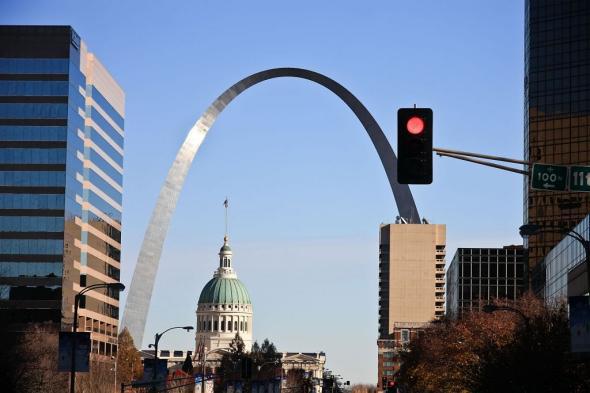On Aug. 28, St. Louis may become the first city in the United States to see its minimum wage fall, from $10 an hour to $7.70 an hour, as the Missouri statehouse enables a pay cut for some 35,000 workers.
That’s the date when a new state pre-emption law, drafted specifically to target St. Louis, is scheduled to take effect. The Missouri measure will override the city’s own minimum wage increase, which was implemented in May after a two-year court battle, and end a three-month period during which fast food, retail, and other workers in the city were required to be paid hundreds of dollars in additional income.
Republican-run states forcing Democrat-run cities to not raise the minimum wage is a story we’ve seen before, of course. Alabama thwarted Birmingham’s efforts in February of last year; Ohio stopped Cleveland in December. More than a dozen other states have passed pre-emptive pre-emptions, abolishing municipal wage laws before any cities or counties consider them. GOP politicians usually say minimum wage ordinances won’t actually help workers, but they also defend the pre-emptions in principle, because they preserve a “uniform regulatory environment.”
St. Louis is a unique case. Shortly after the city passed its minimum wage law in 2015, the Legislature passed—over the veto of then-Gov. Jay Nixon, a Democrat—a pre-emption law to abolish all municipal wage laws not in effect on Aug. 28, 2015, the exact day the city passed the ordinance.* But it was immediately enjoined in a lawsuit filed by local business interests that went all the way to the state Supreme Court. In May, that body decided St. Louis did have the authority to enact a wage law.
So the Missouri Legislature went back and drafted a more specific law that would squash the local ordinance. The idea was to fast-track it in March, before the local wage hike took effect. Thanks to the quirky practices of Jefferson City, though, Democratic state senators managed to stall the measure, forcing Republicans to use a procedural measure to jam the bill through in the waning hours of the session last week.
The St. Louis policy was projected to give an immediate raise of about $2,400 a year to approximately 35,000 workers, before $10 went up to $11 on Jan. 1, 2018. Broadly speaking, there’s a lot of debate over how local wage floors affect employment markets, worker income, hiring, and hours. (Read my colleague Jordan Weissmann’s piece on the complex effects of Seattle’s $12 to $13 minimum wage.)
One thing is clear, though: Minimum wage hikes are popular. More than half of all registered voters supported a $15 wage floor in 2016, according to Pew, much higher than what St. Louis had targeted. And the idea of taking away a raise that has already been given seems particularly cruel; Missouri Gov. Eric Greitens, a Republican who believes the local ordinance will kill jobs, will not attach his signature to the bill, allowing it instead to pass without it. (There is no pocket veto in Missouri.)
A template for St. Louis progressives going forward? Deep-red Arizona, where Gov. Doug Ducey, a Republican, threatened in January of 2016 to withhold funding from cities like Tempe, Tucson, Flagstaff, and Phoenix that had considered or passed various types of worker protections. In November, Arizona voters—while voting for a Republican senator and for Donald Trump—opted to enact a statewide minimum wage increase at the ballot, tying Ducey’s hands. Now that’s a uniform regulatory environment.
*Correction, July 9, 2017: This post originally misspelled Jay Nixon’s last name.
